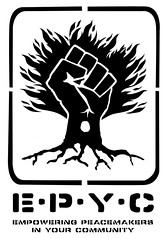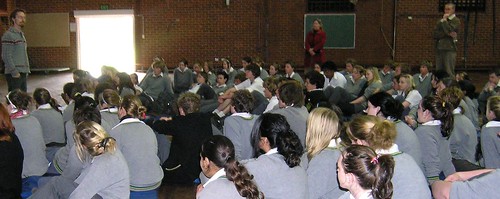


Guest in the backyard: Jarrod McKenna
Can we separate living the gospel from sharing it? Evangelism from the invitation to follow Jesus?
Last night I arrived back from a country tour with ‘Empowering Peacemakers’ (or EPYC) inviting High School students to forsake lives wasteful consumption and dare lose their themselves in lives of compassion on behalf of Jesus’ message for the poor and the earth.
I’m always amazed (!) at the responses.
Yesterday I was ambushed by students wanting to give me hugs (a bit awkward), ask for Bible’s (not something we offer just something they wanted after exploring Scripture in the workshop!!), committed themselves to the FACE UP TO POVERTY campaign and gave up their lunch time to talk about Jesus, their lives, their concerns about the world and the gospel.
-What’s EPYC’s secret that has kids that aren’t Christians queuing up to talk about Jesus after workshops?
-Why is it that young people run up wanting to give hugs and share their stories?
-Why is it that students (who aren’t Christians) ask for copies of the Bible and want to start social justice groups in their schools when many youth pastors have talked to me about difficulties in getting their church youth groups into the Scriptures and moving their focus off themselves!?
-And how is it that EPYC gets asked back into public state schools?

Some thoughts:
1. The Means is the Message
EPYC believes only way to share ‘Jesus is the Way’ is to do it in ‘the Way of Jesus’. The Early Christians where known as ‘people of the Way’ because they were filled with the Spirit to obey everything Jesus commanded (Matt. 28:19-20). Their is no point teaching the texture of the kingdom (nonviolence) if you are going to go about it in forceful ways (the ways of the fallen world).
2. The Medium is the Message
EPYC is committed to embodiment. Young people can feel when people really are living an alternative or if they are just talking a good game. ‘Bait and switch’ has nothing on ’embody and let them ask’ (read 1 Peter 4:15 in the context of verse 8-14 teaching on nonviolence). In sharing personal stories of the empowerment of God’s grace to live as signs of what God has done in Jesus and giving power over to young people to ask questions in the setting of their and our worlds biggest problems
3. The Message is the Message
EPYC believes the gospel is just that… good news! 
4. “History belongs to the Intercessors” (sorry it didn’t start with ‘M’)
EPYC believes, as Walter Wink puts it, “History Belongs to the Intercessors”. We can do solid exegesis and prepare a good workshop but if it hasn’t been covered in solid prayer it isn’t going to have the effects it could have and I’m not going to be in a space where I’m sensitive to what the Spirit is doing.
As Scott McKnight put about EPYC on his blog he resonates deeply with “evangelism programs that invite people to experiment with the way of Christ as a way of coming to Christ.”
After all can we separate living the gospel from sharing it? Evangelism from the invitation to follow Jesus?
Thanks to all those who continue to hold EPYC in prayer.



